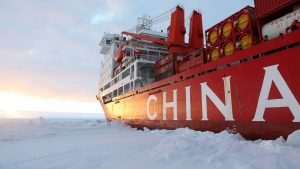
China: The Next Global Superpower?
China’s power and influence around the world is rising rapidly. Many in the West, especially the US, see this as a threat to their global hegemony.
China’s rise is intensifying great power competition around the globe between the US, Russia, and China. This competition is spilling over into the Arctic as China asserts itself as a global maritime power and sees the Arctic as essential to its strategic success. China’s commercial interests in the region are also raising tensions in the Arctic.
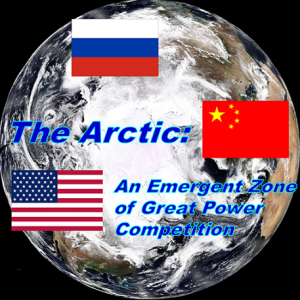
China’s Arctic Presence
China has deep commercial interests in the Arctic, especially in shipping and oil/natural gas extraction. China is using these economic activities, as well as scientific research projects in the Arctic, to justify their identity as a “near-Arctic state.”

These same activities have been cited by Chinese officials and scholars as a reason to build an Arctic military capability. Western officials fear that China is indeed pursuing military capabilities to defend their Arctic interests and have expressed concern about the potential for Chinese research and infrastructure installations in the Arctic to have dual civilian-military uses.
China’s economic endeavors in the Arctic have also led to a growing partnership with Russia, which has the largest Arctic presence of any nation, sparking concern in the West that this may mark the beginning of an expanded strategic and military partnership between the two nations.
The Chinese Military Threat: Real or Perceived?
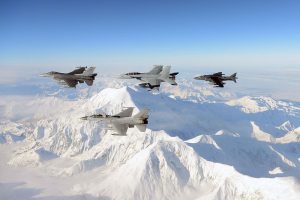
While China has been investing in Arctic military technology, they currently do not have functional Arctic military capabilities. Therefore, the military threat presented by China in the Arctic is still largely just a perceived threat.
How do we know?
Military activity in the Arctic is closely monitored by governments, think tanks, militaries, and international organizations like NATO. The specific military activities of China are tracked closely by China-focused think tanks in the US and Europe, as well as by many actors in the American military and intelligence community. Many scholars at think tanks and universities are also studying developments and making predictions about what China is likely to do next in the Arctic, and how the US and other Arctic states would be likely to react.
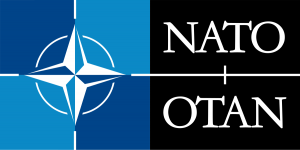
So what does militarization have to do with all this?
Although the Chinese threat is only a perceived threat today, Western nations have been responding to the threat as if it is real and are building up their own Arctic military capabilities. This is leading to a new arms race in the Arctic in which militarization begets militarization, causing a dangerous cycle. The US and others in the West feel the need to respond in this way to avoid being caught unawares when China does achieve Arctic military capabilities.
The trouble with this is that the military response by the West simply makes China feel more urgency to have an Arctic military presence to defend their interests. This is why militarization is such a wicked challenge: each actor feels threatened and seems to only be able to reduce that feeling by arming themselves further.
This situation is exactly what must be avoided to prevent conflict in the Arctic.
Why can’t they just talk it out?
Unfortunately, there is a lack of fora in which Arctic security issues can be discussed. For example, the main Arctic governance body, the Arctic Council, is barred from discussing security issues in the Arctic.
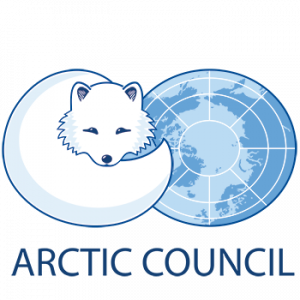
Additionally, as with many other international issues, including fishery management, it is difficult to effectively address challenges without all relevant actors having a seat at the table. When crucial security actors like China and NATO are unable to make their voices heard in existing bodies like the Arctic Council, they feel the need to make themselves heard by using force, further contributing to the dangerous situation of militarization.
Is there any hope for peace?
Yes! Luckily, most actors in the Arctic (including China) want to keep it as a place of peace that can be accessed and economically exploited by all nations and groups. Therefore, there is hope for change to be made. Watch the video to learn more and read on to discover some possible solutions!
[ensemblevideo version=”5.6.0″ content_type=”video” id=”b9b26ab9-b845-42bf-80ad-85e1d624a103″ width=”848″ height=”480″ displaytitle=”true” autoplay=”false” showcaptions=”false” hidecontrols=”true” displaysharing=”false” displaycaptionsearch=”true” displayattachments=”true” audiopreviewimage=”true” isaudio=”false” displaylinks=”true” displaymetadata=”false” displaydateproduced=”true” displayembedcode=”false” displaydownloadicon=”false” displayviewersreport=”false” embedasthumbnail=”false” displayaxdxs=”false” embedtype=”responsive” forceembedtype=”false” name=”Ryan Kovarovics – China and Militarization in the Arctic”]
Solutions:
- Just as with the other Arctic challenges highlighted on this website, the best way to avoid a continued military buildup in the Arctic in response to the perceived growing threat posed by China is to create a space to talk about the issue. This could be part of an existing international organization (such as the Arctic Council or the UN) or as part of a new international body dedicated to discussing Arctic security issues. This space would have to include all relevant actors related to Arctic security, including actors that are not Arctic states, such as China and NATO. Without including all voices at the table with a vote, the interests of China or others could continue to not be represented in international discussions, leading nations to feel a continued need to assert their power and relevance by other means.
- The ideal solution to militarization in the Arctic is active demilitarization. This would entail an agreement by involved actors to draw down their Arctic forces in a coordinated manner, based on a treaty or mutual trust. This would reduce China’s feeling that they need to have an Arctic military presence and would keep the reactionary response of the US and other Western nations in check. Demilitarizing the region is the best way to ensure peace will remain.